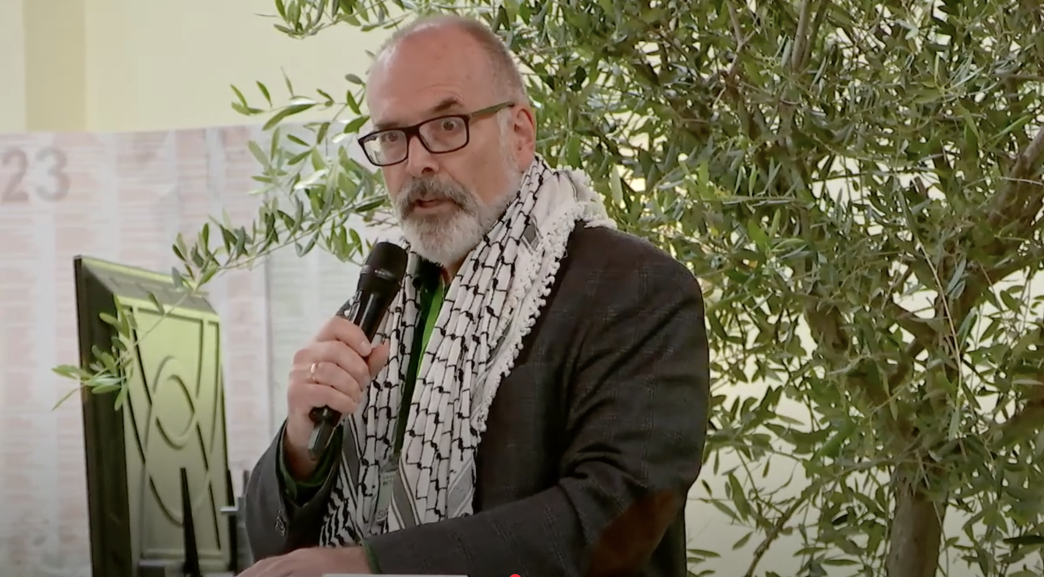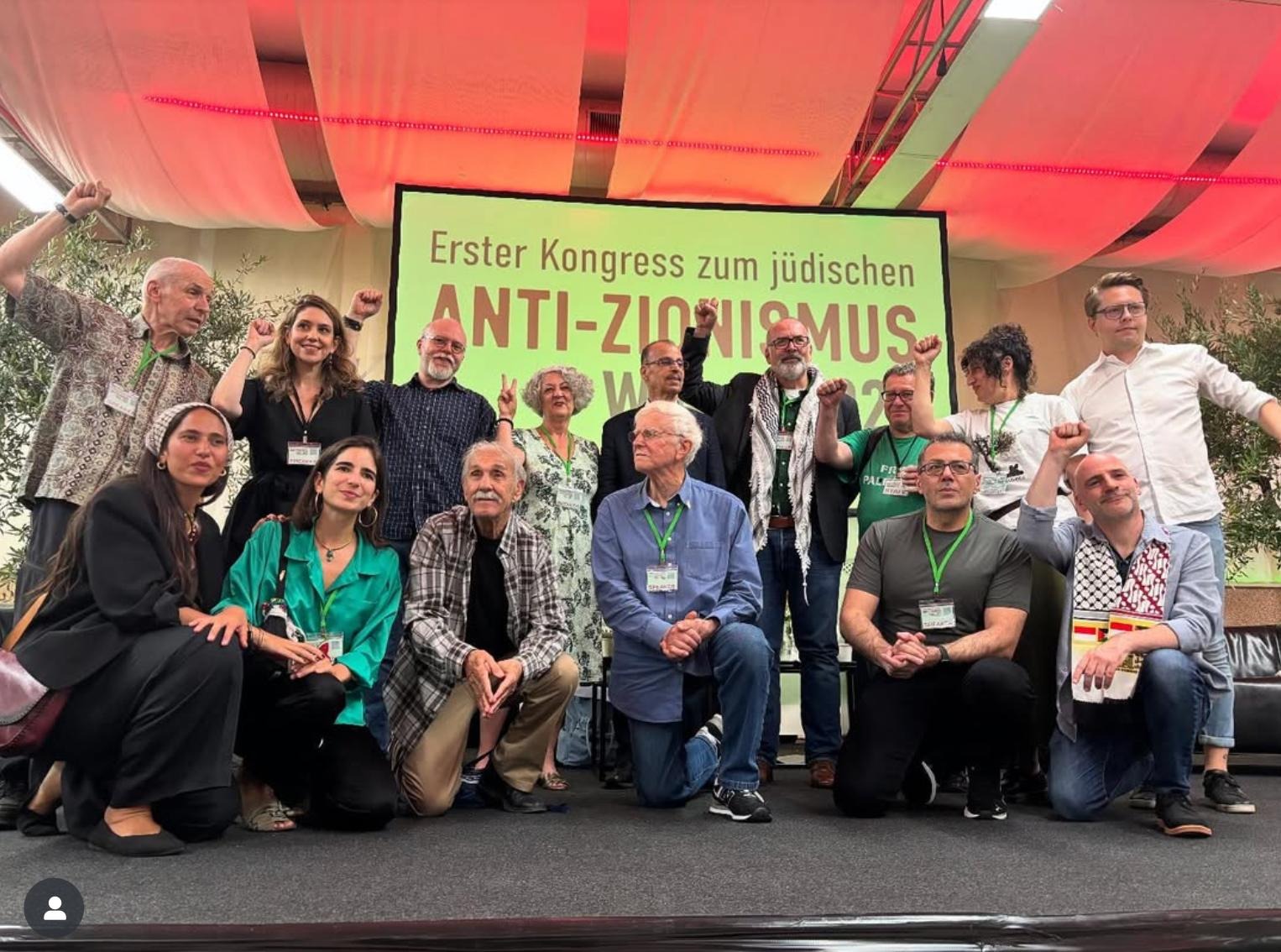FOR nestleder Peter Eisenstein var eneste deltager fra Norge ved den første jødiske anti-sionisme kongress som fant sted 13.-15. Juni 2025 i Wien.
Her er Eisenstein sammen med noen andre deltagere:
Awad Abdelfattah
Dr. Ramzy Baroud
Rahma Zein
Camille Levy Sarfati
Professor Haim Bresheeth

Speech presented at the First Anti-Zionist Congress, by Peter Eisenstein, Deputy Vice-Chair of the Norwegian Peace and Justice Party
Zionism in Norway
It is an honour to be on this panel and to have the opportunity to talk about confronting Israeli impunity and building political action, but I will do so in relation the situation in Norway.
As Stephane mentioned, I am a member of the Norwegian organisation Jewish Voices for a Just Peace, but we are a group that runs on consensus, so I speak only for myself, I do not speak on behalf of the group. But I do speak for the Norwegian Peace and Justice party, Norway’s only anti-imperialist and anti-zionist party.
Zionism is a strong ideology in Norway, much stronger than the relatively small number of Jews might suggest. The total number of Jews living in Norway varies by definition. About 1300 Norwegians identify as Jewish, while Norwegians who are eligible for Israeli citizenship under the law of return more than doubles that figure to about 3000.
We all know the reason why there are so few Jews in Norway. Norway gave up its Jewish population during the Holocaust. Of a pre-war population of about 2100, fewer than half survived. Denmark, by comparison, had about 8,000 people, of which about 100 were killed during the Holocaust. Denmark did not give up its Jews.
Today, Norway is famous for being a nation of peace. And the good news is, Norway is a great supporter of Palestine. For example, since 2002 Norway has maintained an official ban on arms exports to Israel. This is because Norway considers Israel an occupying power. The official trade statistics reflect this; there have not been any Norwegian weapons exports to Israel in over 20 years.
Last year, the Norwegian government recognised the nation state of Palestine. In January this year, Norway hosted the Global Alliance for the Implementation of the Two-State Solution. Palestinian Prime Minister Mohammad Mustafa was the guest of honour.
Demonstrations in Oslo usually begin at the Parliament and then march through the city streets, passing by the royal castle, and end at the Israeli embassy with calls constantly being shouted of “From the river to the sea, Palestine will be free”.
In contrast to many other European countries, the police coordinate closely with us. Instead of blocking our path, the police stop traffic so that we may march uninterrupted.
This all sounds good, doesn’t it?
Perhaps a little too good to be true.
As mentioned, Norway is a country known for peace. Therefore, it might shock some of you to learn that last year, 2024, Norway ranked number 9 in total arms sales. Israel, by comparison, ranked number 8. But considering Norway’s small size, Norway only has about 5.5 million people, it certainly ranks in the top three, if not number one, in arms sales per capita.
Think about that.
This is no small feat for a country world renown for peace.
But then there is the ban on arms exports to Israel. Like most Western nations, Norway, too, has good lawyers, the best of whom are adept at finding loopholes for the Norwegian weapon companies they represent. So while Norway has an official ban on direct arms sales to Israel, Norwegian weapon manufacturers have no trouble at all selling a great amount of weaponry and war machinery to Israel.
For example, the vaunted Israeli air force would not fly very far without essential parts from Norway for their jet fighter engines, the F-35, F-135 and F-136. One of these Norwegian companies, the Kongsberg Group collaborates with the Israeli arms company Rafael on the production of Spike missiles, which are used in Gaza.
Then there is Nammo, the Nordic Ammunition Company. Nammo’s subsidiary, Nammo Talley, manufactures the M72 (Light Anti-tank Weapon) which is used extensively in Gaza. Another example is the M141 Bunker Defeat Munition, a disposable single-shot, shoulder-fired rocket launcher. In October 2023, nearly 2000 of these were shipped from Nammo to Israel.
Nammo is co-owned 50% by the Norwegian government, that is, the Norwegian people, and 50% by the Finnish company Patria. But a quick look at company filings shows that the Norwegian company the Kongsberg Group, owns about half of the Finish company Patria. This means that effectively 75% of Nammo is in Norwegian hands.
But weapons sales is not the only category in which Norway punches above its weight. Raise your hand if you have heard of Norges Bank Investment Management (N-BIM). N-BIM is a stand-alone company within Norges Bank and is responsible for managing the Government Pension Fund Global – you know it as the Norwegian Oil Fund. N-BIM owns close to 2% of all listed companies around the world. Again, something to think about. Fewer than 6 million people own 2% of the world’s stocks.
Luckily for Palestinians, the Oil Fund follows comprehensive ethical guidelines established by the Norwegian Parliament. Companies may be excluded from the oil fund if there’s an unacceptable risk that they contribute to or are responsible for serious human rights violations. The Council on Ethics, which is an independent body, assesses companies and makes recommendations for exclusion.
The guiding principles of the fund are:
- Transparency
- Accountability
- Ethical standards and responsible investment
When it comes to ethical standards and responsible investment, the Council is known to respond quickly to world events. For example, N-BIM took swift action after Russia’s “unprovoked” invasion of Ukraine in February, 2022. Within weeks, the Norwegian government announced that the fund would divest from Russian assets.
But that is Russia. Israel is different.
As we speak, the Norwegian oil fund holds stock in more than 70 Israeli companies, including RTX which even made the UN High Commissioner for Human Rights list of 112 companies whose activities under international law “raise particular human rights concerns”.
Of course the other two points, transparency and accountability, are also important. On March 20 this year, the state pubcaster, NRK, hosted a debate focused on the oil fund’s investment in Israeli companies.
Normally, politicians fight amongst themselves to get on this debate program as it is a chance for them to promote their party’s positions. To quote the moderator of the debate, “It is remarkable that no public official from the Finance Department, from Norwegian Bank, no one from N-BIM, no one from the oil fund, not even the oil fund chief Nicolai Tangen, would agree to participate to explain the management of our public investments. That is the way it is, in Norway.”
As you might have gathered, the ethics council itself is a bit of a joke. It is not as if they review companies the oil fund is considering to purchase. They review companies only after the oil fund has purchased them.
To quote a headline from the left-wing newspaper Klassekampen, “The UN warned that the Oil Fund’s stock holdings could cause Norway to contribute to crimes against humanity. Then the fund invested billions more.”
At present, Norway has a labour government. And the complicity of Norway in the genocide can be seen in their actions just last week. The Norwegian parliament, led by the labour party, voted down a proposal to have the oil fund divest from Israeli companies. No one even bothers to talk about weapon sales anymore.
To be fair, the Norwegian government is not completely passive. Just four days ago, this past Tuesday, Norway sanctioned the Israeli ministers Smotrich and Ben-Gvir. According to the government website, “The sanctions… mean that the two ministers are denied entry to Norway.”
Be it Jews during the Nazi holocaust, or Palestinians during this Zionist genocide, Norway proves that talk is cheap. The hard business of money over principles has rarely been seen in such stark relief as in Norway today.
Does this make Norwegian politicians Zionists? I would argue that it does. If not in word, then certainly in deed.
And what do words matter to the dead, anyway?
So when speaking about how to confront impunity and build international pressure through sanctions and political action, my suggestions are not aimed at Israel, nor the United States. Because I believe genocide changes things.
Boycotts are good against apartheid. But this is genocide. Divestment and sanctions are good against ethnic cleansing. But this is genocide. To paraphrase the title of Haim’s (Bresheeth) wonderful book, genocide is a crime like no other.
Writing in 1964, the German philosopher Hans Magnus Enzensberger said, “Yesterday’s ‘final solution’ has been accomplished. Tomorrow’s final solution is still being prepared. Neither will be the work of individuals, but the work of all; or it will not be. Without the powerless, the powerful are powerless.”
I believe his words were as true then, prophetic even, as they are today. Who are the powerless today? The leaders of our European nations, most if not all of whom are but lackeys to US imperialism for which Zionism is but a tool.
Until now, being useful idiots of empire has not come at a price for our political and industrial leaders. Indeed, they profit from it.
As we all know, the July 19, 2024 advisory opinion of the International Court of Justice obligates member states to take all measures to prevent genocide.Across the board our leaders have failed in
-The Duty of Non-Recognition
-The Obligation to Cease Aid or Assistance
-The Positive Obligation to Cooperate in Ending Violations
This means the actions of our leaders – and more importantly their inaction – can be punished by the same laws they apply to others.
We cannot stop this genocide, we can only stop it from getting worse. But what we must do is punish the criminals guilty of this crime.
Therefore my suggestion for action is to follow the precept of Scottish conservationist Patrick Geddes “Think globally, act locally”. Today’s standard, where our own laws do not apply to us, must end.
And with Palestine in mind, the entire West is now guilty – and we must act. Instead of tilting at windmills, we must aim at our local leaders who commit these crimes in our name. Unless we punish these criminals, our criminals, in each our own Western country, our leaders over whom we are meant to have democratic control, unless we punish our criminals, this crime will be repeated.
And if we fail, if these criminals – our criminals – do not face justice, then we will all be guilty of the next crime against humanity which is being prepared, and is sure to come.
 NO
NO